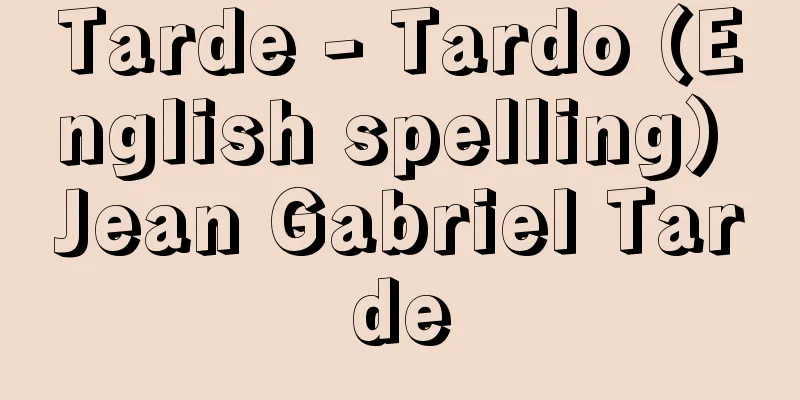Teleology - Teleology (English spelling)

|
This is the idea that the creation and change of all things in the world operates towards a great purpose. It was named by the German philosopher Wolf, but the idea itself is very old, and in ancient times this was actually the more natural idea. However, what determines this "purpose" and what its specific content is vary depending on the era and the person. A simple idea is that everything in the world exists for the benefit of humans, but ultimately it is natural to think that such a world was created by God, and in that sense it is only natural that teleological thought was mainstream in ancient and medieval times. It was Aristotle who systematized teleology philosophically. According to him, all things consist of form and matter, and form is also the final cause of the generation of each individual thing. However, each individual thing also moves toward the higher form as its end, and ultimately, the entire world moves toward the first form as its highest end. Christian theology from the peak of the Middle Ages onwards developed a clearer teleology based on Aristotelian thought and by emphasizing the will of God the Creator. In modern times, Christian teleology was rejected and replaced by a mechanical view of nature. Descartes, Spinoza, and F. Bacon all acquired natural scientific and mathematical thinking, but rejected teleological thought. However, in the 18th century, Kant, on the one hand, asserted the absoluteness of the laws of natural science in explaining the world of phenomena and showed a world of necessity, but on the other hand, he also recognized the significance of teleological explanations as a controlling principle, and once again opened the way to the teleological inclination deep within humans. However, conventional teleology underwent a complete transformation with the emergence of Darwin, whose theory of evolution rejected teleological ideas about individual organisms, but on the other hand, evolution itself predicted a new form of the concept of purpose. Thus, teleology was originally the name of a position that explained the existence and creation of objective things, but in general, any thought that has purpose as a fundamental principle can be said to be teleology. For example, teleology in criminal thought and utilitarianism, which judges the value of an act by its purpose or result, can also be called teleology in a broad sense. [Takemura Yasuo] Source: Shogakukan Encyclopedia Nipponica About Encyclopedia Nipponica Information | Legend |
|
世界のすべての事物の生成変化が、大いなる目的を目ざして運行している、という考え方をいう。命名はドイツの哲学者ウォルフであるが、考え方自体は非常に古く、古代においてはむしろこのほうが自然であった。ただ、この「目的」が何によって設定されているのか、具体的内容はどういうものか、となると、時代や人によって多様である。素朴なものとしては、世界のすべてが人間のためにある、という考え方があるが、最終的にはそうした世界は神によってつくられたとするのが自然であって、その意味では、古代や中世で目的論的思想が主流であったのは当然である。 目的論が哲学的に体系化されたのは、アリストテレスにおいてであった。彼によると、すべて個物は形相と質料とから成り立つが、形相はまた個物生成の目的因でもある。だが、その個物はまたより上位の形相を目的として運動し、究極的には、世界全体が第一形相を最高目的として運動する、という。中世最盛期以降のキリスト教神学は、このアリストテレス思想を基礎とし、創造主たる神の意志を前面に出すことによって、いっそうはっきりした目的論を展開した。近代においては、キリスト教的目的論が否定され、機械的自然観がとってかわる。デカルトやスピノザあるいはF・ベーコンなど、いずれも自然科学的・数学的思考を身につけながら、目的論的思想を排除していく。しかし、18世紀に入り、カントは、一方で、現象の世界を説明する際に、自然科学的法則の絶対性を主張して必然の世界を示しながら、他方では、統制的原理として目的論的説明にも意義を認め、人間の奥底にある目的論志向にもふたたび道を開いた。しかし、従来のような目的論は、ダーウィンが出るに及んで一変する。その進化論は、個々の有機体についての目的論的思想を排するが、他方では進化そのものが新しい形の目的概念を予想させることとなった。 目的論はこのように、初め、客観的事物の存在や生成を説明する立場の名称であったが、総じて、目的というものを基本原理とする思考全般が目的論である、ともいえる。たとえば、刑罰思想における目的刑論や、行為の価値をその目的や結果によって判定する功利主義なども、広義における目的論ということができるであろう。 [武村泰男] 出典 小学館 日本大百科全書(ニッポニカ)日本大百科全書(ニッポニカ)について 情報 | 凡例 |
>>: Purposeful jurisprudenz (English: Zweckjurisprudenz)
Recommend
Visayan people - Visayan people (English spelling) Visayan; Bisayan
A group of Neo-Malay people who live mainly in the...
Gu Kaizhi (English spelling)
Born: circa 344. Jiangsu, Wuxi [Died] circa 406 A ...
Color constancy
...This is because the perceptual system distingu...
Girard, PSB (English spelling) GirardPSB
…Despite the persecution during the French Revolu...
Adel
… [Western] In Western history, the term aristocr...
Naematoloma fasciculare (English spelling)
…[Rokuya Imaseki]. . … *Some of the terminology t...
Takashi Ono
Born July 26, 1931. Akita gymnast. Graduated from ...
Iwai Kumesaburo (II)
…Choreography by Nishikawa Senzo IV. Performed by...
Advisory body - Simon Kikan
An administrative body that has the authority to ...
《Kyoto Children's Pursuit》 - Kyowarabe Atooi
...The book is written in the form of a clever bo...
Holon
…He later entered the field of science history an...
Shetland
A British TV series. Original title: Shetland. BBC...
Tsvet, MS (English spelling) TsvetMS
… What distinguishes the 20th century organic che...
Azalea - Azalea (English spelling)
It is an old genus name included in the genus Rho...
Cebidae
…the name is a general term for the New World mon...





![Dezhnev [Cape] - Dezhnev](/upload/images/67cc4342d1dfb.webp)



